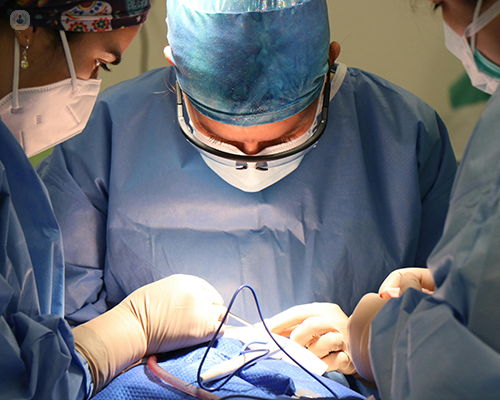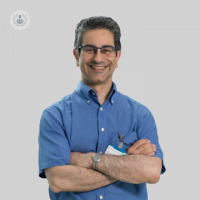Carotid surgery explained: How it prevents stroke
Written in association with:Carotid surgery is a highly effective procedure for preventing strokes in patients with severe carotid artery stenosis. This surgical procedure aims to remove blockages within the arteries, restore normal blood flow, and significantly reduce the risk of stroke. Professor Vassilis Hadjianastassiou, renowned consultant vascular, general, and transplant surgeon, provides an expert insight.

What are the indications for carotid surgery?
Carotid surgery, also known as carotid endarterectomy, is a critical procedure designed to prevent future strokes by addressing stenosis (narrowing) of the carotid arteries which is often caused by atherosclerosis - a build-up of plaque.
The carotid arteries, located in the neck, are essential pathways for blood flow to the brain. When they become narrowed or blocked due to plaque build-up, the risk of stroke increases.
Thus, carotid surgery might be recommended:
- If you have had a stroke or a transient ischaemic attack (TIA) caused by carotid artery stenosis.
- If you don’t have symptoms, but have severe carotid artery stenosis that can be detected through imaging tests.
How is carotid surgery performed?
Carotid surgery is a surgical procedure that involves the removal of plaque from the carotid arteries to restore blood flow to the brain.
Prior to surgery, you will undergo a series of preoperative evaluations, including a physical examination, blood tests, and imaging studies like ultrasound, CT scan, or MRI to assess the extent of the stenosis. The operation is typically performed under general anaesthesia, though local anaesthesia with sedation may be used in some cases.
During carotid surgery, your vascular surgeon will make an incision along the side of the neck to expose the affected carotid artery. To isolate the surgical site, your surgeon will temporarily clamp the artery on both sides of the plaque. Your surgeon will then make an incision in the artery to remove the plaque, sometimes using a patch to widen the artery if needed.
Once the plaque has been removed, your surgeon will suture the artery and neck incision close. Blood flow will be restored by unclamping the artery, and your surgeon will check for any bleeding. You will then be monitored in a recovery area before being moved to a hospital room for further observation.
What follow-up care is required after carotid surgery?
Postoperative care is essential for a successful recovery following carotid surgery. You will typically stay in hospital for one to two days after the surgery, during which you will be closely monitored for potential complications such as bleeding, infection, or stroke.
Once at home, proper wound care is crucial to avoid infection, and you will thus receive guidance on keeping the incision clean and dry. To allow proper healing, you will need to avoid strenuous activities and heavy lifting for several weeks.
Additionally, you will be prescribed antiplatelet or anticoagulant medications to prevent blood clots, along with medications to manage blood pressure and cholesterol levels. Regular follow-up appointments with your surgeon will also be necessary to monitor your recovery and the condition of the carotid artery. Imaging tests may also be conducted periodically to ensure the artery remains clear.
Is carotid surgery the only option to prevent stroke?
Carotid surgery isn't the only option. Alternatives include:
- Carotid angioplasty and stenting (CAS): This minimally invasive procedure involves inserting a balloon catheter to widen the narrowed artery and placing a stent to keep it open.
- Medical treatment: For patients who have mild to moderate carotid artery stenosis or patients who are asymptomatic, a combination of antiplatelet medicines, cholesterol-lowering medications, and strict control of blood pressure may be sufficient to manage the condition and reduce stroke risk.
How successful is carotid surgery in preventing stroke?
For symptomatic patients who have had a TIA, carotid surgery can cut the risk of a subsequent stroke by about 50% over the following two to three years. In asymptomatic patients with severe carotid artery stenosis, carotid surgery reduces the risk of stroke by approximately 50% over the next five years compared to those who receive only medical treatment.
Additionally, the benefits of carotid surgery also extend beyond the immediate postoperative period, with clinical studies demonstrating continued stroke prevention over several years.
If you would like to book an appointment with Professor Vassilis Hadjianastassiou, head on over to his Top Doctors profile today.


